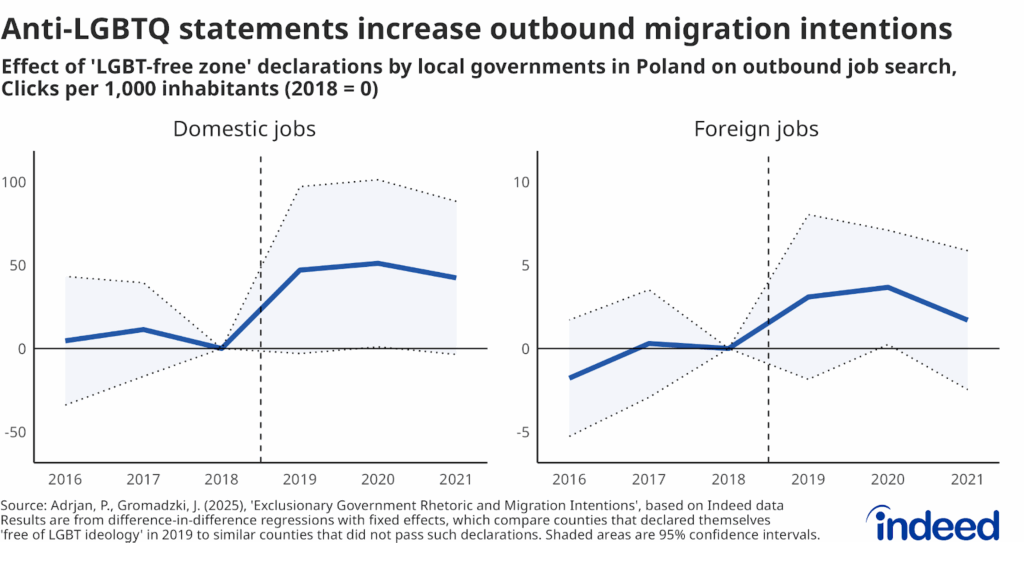Key points:
- After almost 100 local governments in Poland adopted anti-LGBTQ+ resolutions, job searches from Polish workers to domestic areas not covered by the resolutions rose by 12% and international job searches rose by 15%.
- The rise in outbound search was not offset by jobseekers from elsewhere looking in the affected areas, suggesting a net outflow of talent.
- Estimates based on Census data suggest a 1% population decline, implying tangible negative demographic consequences of exclusionary government rhetoric.
When considering why people migrate, thoughts usually turn to big issues, including war, repression, or huge economic opportunity. But the decision to leave home can also be sparked by more subtle shifts, such as exclusionary government rhetoric targeting a specific group.
In 2019, nearly 100 local governments across Poland adopted formal resolutions declaring their localities “free from LGBTQ ideology.” While these resolutions had no direct legal power over residents, they were highly publicised, discriminatory, and sent a clear signal about local social norms and the stance of local political leaders. They also led to a rise in outbound job searches as people sought to move out of the affected areas, according to a our new analysis.
Outbound job search surged after exclusionary declarations by local governments
Conventional administrative or survey data can be slow to capture shifting intentions and may undercount migration due to a lack of enforcement of registration requirements. But Indeed’s global data on job searches offers a hyper-local, revealed-preference measure of migration intentions. To isolate the impact of the resolutions on workers’ desire to migrate, we compared the job search patterns of users located in Polish counties that adopted anti-LGBTQ+ resolutions with those of users from similar, neighbouring counties where local governments did not adopt such resolutions.
The dataset captures almost 67 million clicks on job postings by Polish jobseekers between 2016 and 2021. Clicks on job postings outside the jobseeker’s area of residence can be interpreted as a strong indicator of an interest in migrating, either domestically or internationally.

In counties that adopted anti-LGBTQ+ resolutions, domestic out-of-county job search increased by 41 clicks per 1,000 inhabitants compared to control counties, a 12% rise. International job search from these counties increased by about 3 clicks per 1,000 inhabitants, representing an even larger proportional increase of 15%.

The increase in job search was not caused by existing job seekers looking harder, but instead was primarily driven by new people entering the job search pool. This suggests that the resolutions motivated previously inactive jobseekers to begin exploring relocation options. The effects were also visible across high-, mid- and low-wage jobs, indicating that all segments of the labour market were affected.
Jobseekers looked for work in places with stronger LGBTQ+ rights
Both domestic and international job search activity was directed towards more inclusive destinations. Within Poland, people looked at jobs in areas that had not introduced anti-LGBTQ+ declarations. Internationally, outsized attention was given to job postings in European countries that had legalised same-sex marriage. This suggests that people were actively seeking locations where they or their loved ones might feel safer and more accepted, and/or where the social and political environment was more aligned with their own views. These results held even when accounting for other factors, including economic considerations and distance, suggesting the destination choices were deliberate.

Local social norms matter
The mechanism driving these results appears to be a shock to perceptions of local social norms. The declarations likely signalled hostility towards LGBTQ+ individuals and their allies, prompting many to reassess their safety or social acceptance in their current location. The increase in outbound job search was largest in counties that had relatively low support for the right-wing parties behind the exclusionary rhetoric before the resolutions were passed. This is consistent with the idea that in areas where the declared norms clashed more with people’s prior expectations, the resolutions served as a more-alarming signal.
No sizable effects of the resolutions on local labour demand or public safety were observed. The lack of an effect on labour demand suggests that the observed increase in outbound job search was not a response to shrinking local job opportunities. Similarly, the absence of changes in public safety suggests that the results are not driven by short-run concerns about crime or insecurity.
Increased job search led to actual migration
This analysis focused on migration intentions expressed through job search, but some analysis was also done to check if these intentions translated into population changes. Address-change registration requirements are not consistently enforced in Poland, causing some data reliability issues, and the best available data source was the country’s 2011-2021 decennial census.
To generate an additional source of variation, this analysis focused on young cohorts born between 1994 and 2010. In 2011, all those individuals were too young to make independent migration decisions. By the next census, however, roughly half had reached adulthood and could determine their own place of residence. We compared changes in the population of those young adults to those still under 18 in counties with and without anti-LGBTQ+ resolutions.
Estimates indicate a roughly 1% population decline for those aged 18-27 in counties with resolutions compared with the reference cohort. This is economically significant: If this decline were concentrated solely among LGBTQ+ individuals, it would imply a very high rate of outward migration. The effect was statistically significant among young adult women, but not men, possibly reflecting the link between anti-LGBTQ+ attitudes and traditional gender role expectations. To ensure that these population changes were not simply the result of broader demographic trends, it was verified that the resolutions had no significant effects on fertility or mortality rates.
While not as statistically strong as the job search analysis, these findings suggest that increased migration intentions were not just “wishful clicking.” They translated into actual population losses, highlighting the tangible demographic consequences of exclusionary government rhetoric.
Broader implications globally and in the EU
The context of Poland’s membership in the European Union is important. The ability to freely work in other EU countries and proximity to countries (including Germany) with stronger LGBTQ+ protections likely facilitated individuals’ responsiveness to the “early warning signal” provided by the resolutions. These conclusions are thus highly relevant to other EU countries and to federal nations with single labour markets and varying local policies. They are also likely to be generalizable to other minority groups that may face social, political and/or institutional hostility, including ethnic or religious minorities.
This analysis highlights a powerful point: exclusionary government rhetoric, even when not immediately backed by legal changes, can have tangible effects on people’s behaviour, including fundamental decisions like where to live and work. This highlights the potential labour market consequences when segments of the population feel targeted or unsafe. The long-term implications of such an outflow of talent remain a critical consideration for local employers and the broader economy.
Methodology
Migration intentions were measured by tracking clicks on Indeed job postings by jobseekers. Jobseeker location was determined based on IP addresses. Jobseekers whose location could not be determined were removed from the analysis.
Before analysis, all data was stripped of personal identifying information, including names or addresses. Only aggregated results are reported. A review was also performed to ensure that data points could not be tied back to individuals.
For more details about the data and methodology, see the working paper, “Exclusionary Government Rhetoric and Migration Intentions”.


